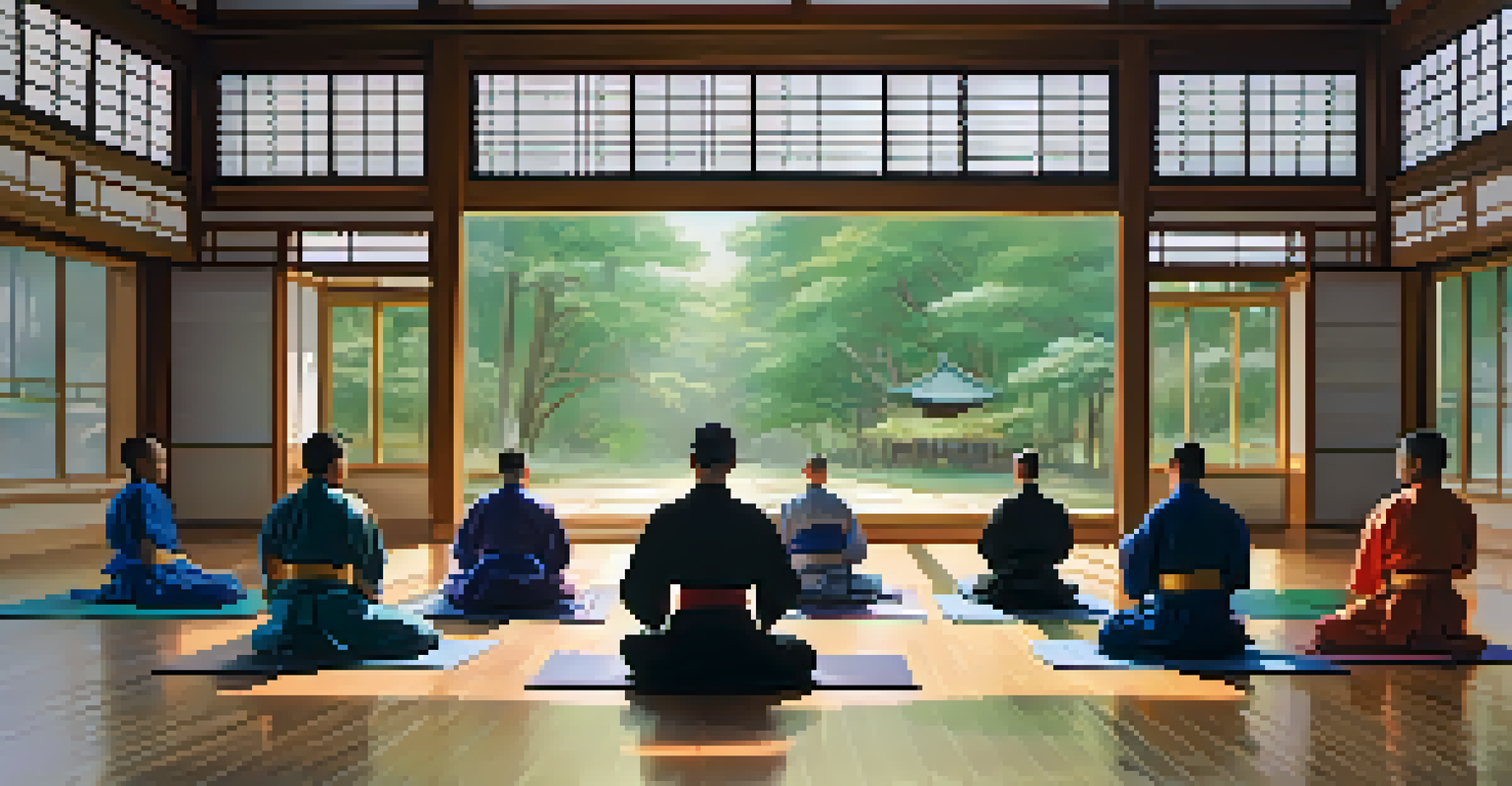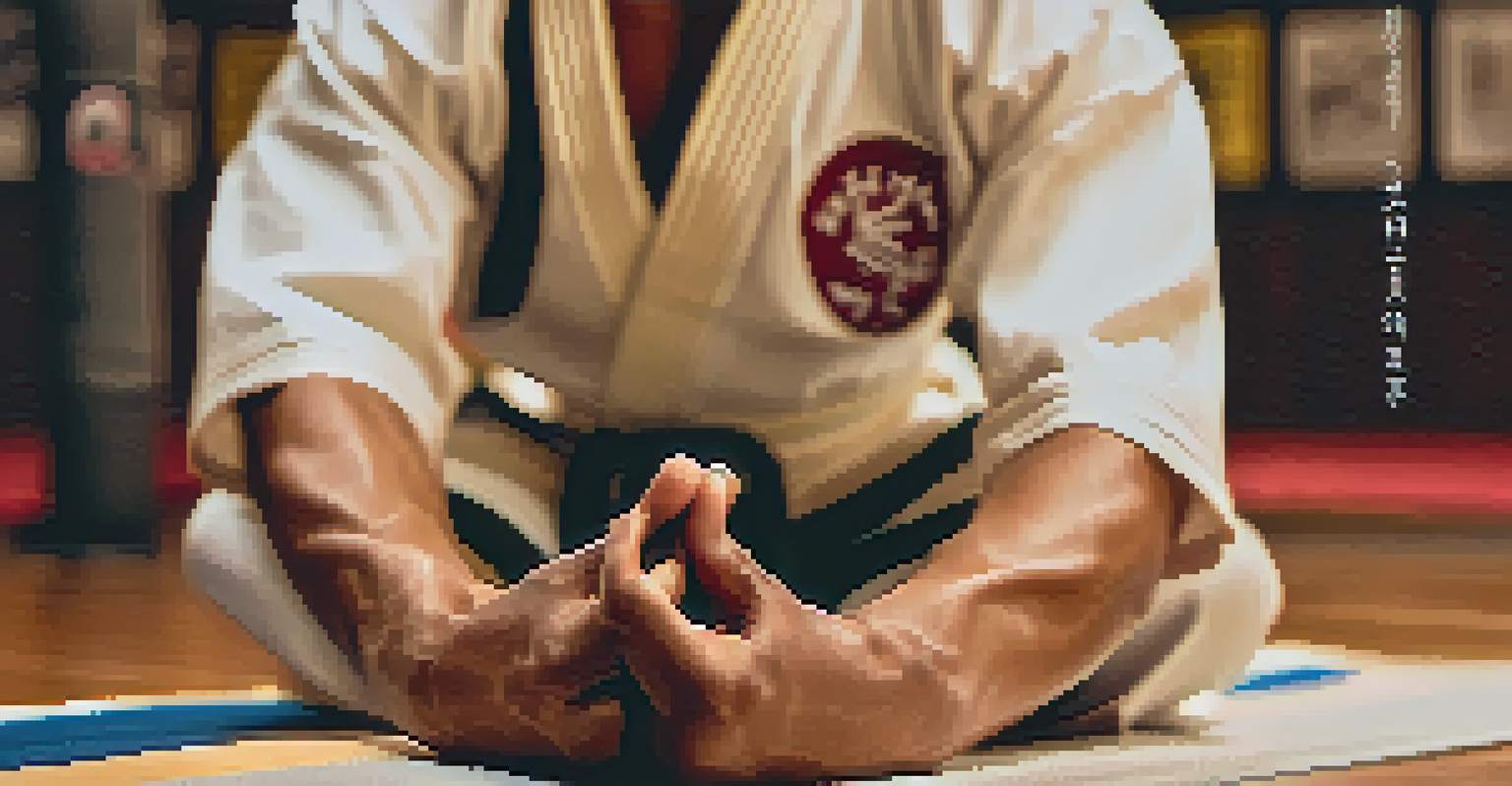The Role of Meditation in Martial Arts and Work-Life Harmony

Understanding Meditation in Martial Arts Practice
Meditation is a cornerstone of many martial arts traditions, serving as a bridge between the mind and body. It helps practitioners cultivate focus, discipline, and a heightened sense of awareness. Just as a martial artist learns to harness their physical strength, meditation allows them to channel their mental energy effectively.
The mind is everything. What you think you become.
In practice, this means that during meditation, martial artists can visualize techniques, develop greater reflexes, and remain calm under pressure. It's akin to sharpening a sword; without the right focus, the blade becomes dull. By integrating meditation into their routine, martial artists enhance their overall performance and resilience.
Moreover, meditation encourages a deeper understanding of oneself, which is crucial in martial arts. It helps individuals confront their fears and limitations, ultimately fostering personal growth. This introspection not only improves their martial skills but also contributes to their emotional well-being.
The Benefits of Mindfulness in Martial Arts
Mindfulness, a key aspect of meditation, plays a vital role in martial arts training. It allows practitioners to stay present in the moment, enhancing their reaction times and decision-making skills. By focusing on the here and now, martial artists become more adaptable to changing circumstances in a sparring match or competition.

For example, when a martial artist practices mindfulness, they are less likely to be distracted by external pressures, such as an upcoming tournament or performance anxiety. This focus can mean the difference between victory and defeat. It’s similar to a tightrope walker who must concentrate on each step to maintain balance and avoid falling.
Meditation Enhances Martial Arts Skills
Integrating meditation into training helps martial artists sharpen their focus and visualize techniques, ultimately improving performance.
Additionally, mindfulness can reduce stress and anxiety, which are common in both martial arts and everyday life. By developing this mental discipline, practitioners learn to manage their emotions, leading to improved performance and personal relationships. As a result, they cultivate a sense of calm that extends beyond the dojo.
Meditation Techniques for Martial Artists
There are various meditation techniques that martial artists can incorporate into their training. One popular method is focused breathing, where practitioners concentrate on their breath to center their thoughts. This technique is powerful because it can be done anywhere, making it accessible before or after training sessions.
Meditation is not a means to an end. It is both the means and the end.
Another effective technique is visualization, where one imagines executing specific moves or techniques successfully. This mental rehearsal not only boosts confidence but also helps in muscle memory development. Think of it as mentally practicing a dance routine before hitting the stage; it prepares the mind and body for the actual performance.
Lastly, moving meditation, such as Tai Chi, combines physical movement with mindfulness, allowing practitioners to flow through techniques while remaining grounded. This approach enhances coordination and fluidity in martial arts, creating a harmonious connection between mind and body. It illustrates how meditation doesn’t have to be static; it can be dynamic and engaging.
Creating Work-Life Balance Through Meditation
In today’s fast-paced world, finding work-life balance can feel like an uphill battle. Meditation serves as a tool to help individuals regain control over their lives by fostering a sense of peace amidst chaos. Just as martial artists train to maintain their composure in combat, professionals can use meditation to navigate workplace challenges.
By dedicating a few minutes each day to meditation, individuals can reduce stress, improve focus, and enhance overall productivity. Picture it as sharpening your mental tools before tackling a project; a clear mind can lead to more innovative solutions and better decision-making. This approach not only benefits personal well-being but also contributes positively to workplace dynamics.
Mindfulness Boosts Work Productivity
Practicing mindfulness through meditation increases focus and reduces stress, leading to higher productivity in the workplace.
Moreover, meditation encourages self-reflection, enabling individuals to assess their priorities and set boundaries. This clarity helps in distinguishing between urgent tasks and those that can wait, allowing for a more sustainable work-life integration. Ultimately, meditation empowers individuals to lead more balanced and fulfilling lives.
The Connection Between Mindfulness and Productivity
Mindfulness, cultivated through meditation, has a direct impact on productivity levels. When individuals are fully present and engaged, they are more likely to complete tasks efficiently and effectively. This heightened focus can lead to fewer errors and a greater sense of accomplishment throughout the workday.
For instance, a study found that employees who practiced mindfulness showed a significant increase in their ability to concentrate and manage stress. This is similar to how martial artists improve their performance by honing their focus during training sessions. By applying these principles in the workplace, professionals can enhance their output.
Additionally, mindfulness fosters creativity, allowing individuals to approach problems from different perspectives. In martial arts, creativity often leads to unique techniques or strategies during competition. Similarly, in a work environment, innovative ideas can arise from a mind that is calm and open, further driving productivity and job satisfaction.
Integrating Meditation into Daily Routines
Integrating meditation into daily life doesn’t have to be overwhelming. Small, consistent practices can create significant changes over time. For example, starting with just five minutes of meditation each morning can set a positive tone for the day, much like a martial artist begins their training with warm-up exercises.
Individuals can also schedule short breaks throughout the day to practice mindful breathing or even a quick body scan to check in with their feelings. These moments of pause allow for mental resets, akin to how martial artists regroup after sparring sessions. Finding these small pockets of time helps to maintain focus and reduce stress.
Meditation Cultivates Life Balance
Regular meditation fosters self-awareness and emotional regulation, helping individuals achieve a healthier work-life balance.
Moreover, incorporating meditation into martial arts training can enhance the experience. Practitioners can set aside time before or after classes to meditate, reinforcing the lessons learned on the mat. This not only strengthens their martial skills but also deepens their understanding of the mind-body connection, promoting overall well-being.
The Lasting Impact of Meditation on Life Balance
The benefits of meditation extend far beyond martial arts and work-life balance; they create lasting changes in one’s overall quality of life. By fostering mindfulness and self-awareness, individuals can cultivate healthier relationships and a greater sense of fulfillment. This holistic approach allows for personal growth that permeates all aspects of life.
As practitioners continue to integrate meditation into their routines, they often notice improvements in emotional regulation and resilience. Just as martial artists learn to adapt to physical challenges, those who meditate become better equipped to handle life's ups and downs. This adaptability is a valuable asset in both personal and professional realms.

Ultimately, the role of meditation in martial arts and work-life harmony emphasizes the importance of mental wellness. It illustrates that taking care of the mind is just as crucial as physical training. By embracing these practices, individuals can lead more balanced, purposeful lives, enriched by the lessons learned both on and off the mat.